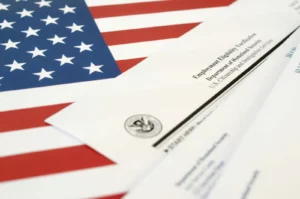HR Legislation: 2024 Updates to Independent Contractors and Joint Employer Rules
New year, new regulations—commonplace for businesses and HR departments. Two new labor rules of interest to HR professionals are set to take effect in the early months of 2024. **UPDATE**- Judge J. Campbell Barker of the U.S. District Court for the Eastern District of Texas vacated the National Labor Relations Board’s joint employer rule late […]
Read ArticleDOL Proposes New Overtime Rules: What to Know and How to Prepare
The U.S. Department of Labor will propose an increase of the minimum salary threshold for overtime eligibility under the Fair Labor Standards Act to $1,059 per week, or $55,068 per year, the agency announced Wednesday. What are the new overtime rules proposed by DOL? The proposed threshold would mark an increase from the current level […]
Read ArticleWhat Employers Should Know About the Form I-9 Update
In late July 2023, the United States Citizenship and Immigration Services (USCIS) announced the release of an updated Form I-9. The purpose of Form I-9 is to verify employment eligibility in the United States. Shortened and streamlined, the new form is now available to employers and will be the preferred version after August 1, 2023. […]
Read ArticleBiden Administration Seeks to End Moral Opt-Out of Contraceptive Mandate
Facing a looming recession, rising healthcare costs, and growing worker dissatisfaction, the Biden Administration has ramped up efforts to lessen the impact of these issues in the new year. Last month, the FCC proposed a ban on Non-Compete Agreements. This month, they are seeking easier access birth control for women at no cost under the […]
Read ArticleFederal Trade Commission Proposes Ban on Non-Compete Agreements
The New Year is a time for change—both personally and professionally. The Federal Trade Commission kicked off the new year with a historical proposal—one they hope will last, unlike so many unfulfilled New Year’s resolutions. The Federal Trade Commission proposed a rule that would prohibit employers and employees from entering non-compete agreements. Employers could not […]
Read ArticleHealthcare Employer Vaccine Mandate: What Employers Need to Know
Last year, the Biden administration announced an ambitious, two-part plan to boost the vaccination of American workers against COVID-19—the Large Employer and Healthcare Employer Vaccine mandates. Separate U.S. Supreme Court decisions Both components of Biden’s plan were immediately met with legal challenges through various levels of the court system. Earlier this month, the U.S. Supreme […]
Read ArticleEmployer Vaccine Mandate: FAQs and What Businesses Should Do to Prepare (UPDATED)
**UPDATE 1/13/2022** After hearing arguments last Friday, the U.S. Supreme Court issued a stay on OSHA’s COVID-19 vaccination emergency temporary standard in their decision published today. Justices Neil Gorsuch, Samuel Alito, and Clarence Thomas issued an opinion occurring in the decision while Justices Stephen Breyer, Sonia Sotomayor, and Elena Kagan dissented. “Although Congress has indisputably […]
Read ArticleHR Compliance Update: New Laws in 2022 and How They Affect Your Business
Welcome to 2022! As we celebrate a new year, it is important to discover and prepare for whatever we can as HR professionals and business owners—particularly with HR compliance . With the start of every year, new laws and regulations take effect. From a HR compliance standpoint, these laws can cover almost any aspect of […]
Read ArticleWhat Businesses Need to Know About the New Employer Vaccine Mandate
As the COVID pandemic extends deeper into its second year, a national vaccine mandate has become a hot topic. While that kind of sweeping legislation will likely never come to pass, the Biden administration did make two significant moves last week to inch the nation closer. Americans who have received at least one dose of […]
Read ArticleHR Legislation: Joint Employment, Independent Contractors, Overtime Exemption, and COVID Disability
As a fourth wave of COVID spreads across the country, the Biden administration is working to refine existing COVID legislation, while also passing new measures designed to protect people. The most recent HR legislative updates involve: Protecting COVID long haulers Reexamining overtime exemption requirements Rescinding Trump era employment policies Take a deeper dive into these […]
Read ArticleThe American Rescue Plan Act: What Employers Need to Know
The American Rescue Plan Act (ARPA) was signed and passed into law by President Joe Biden on March 11, 2021. The legislation allocates $1.9 trillion in relief in response to the COVID-19 pandemic, including additional and extended relief for workers. The ARPA is the latest COVID relief effort put forth on the Federal level. Just as with previous COVID-related legislation, Netchex is committed to keeping clients up-to-date […]
Read ArticleWhat Employers and Employees Need to Know About the Payroll Tax Deferral
There has been a great deal of uncertainty in recent weeks surrounding President Trump’s Memorandum on payroll taxes issued earlier this month (on August 8). Meant as economic relief during COVID-19, the Memorandum allows employers to defer withholding, deposit, and payment of the employee’s portion of the Social Security tax (6.2%) through the end of […]
Read Article











